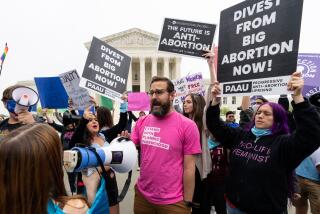Untested drugs ban is upheld
WASHINGTON — The Supreme Court turned down an appeal Monday that sought a right for dying patients to try promising and potentially life-saving drugs that have not yet won government approval.
Instead, the court let stand a policy of the Food and Drug Administration that generally forbids the use of experimental and unapproved drugs to treat patients in the United States.
The court’s action is a setback for tens of thousands of dying patients who cannot wait for years until these promising drugs are shown to be safe and effective in clinical trials, said lawyers for the Abigail Alliance for Better Access to Developmental Drugs. These patients have “no remaining treatment options,” said Richard Samp, counsel for the Washington Legal Foundation, which represented the patients’ group in the case.
They also have no good legal options now, but Samp said the lawsuit has put more pressure on the FDA to help dying patients get into clinical trials. “We will continue to try to persuade FDA to liberalize its rules for compassionate use of drugs that are in the experimental stage,” he said.
Drug companies that are testing promising drugs can ask the FDA to permit their use with some dying patients. “The process is very cumbersome, and the application has to come from the manufacturer,” not a doctor and patient, Samp said.
Another potential avenue is through Congress, which could pass a law requiring the FDA to give dying patients access to potentially life-saving drugs.
If nothing else, the high court’s refusal to consider this claim shows how the justices are wary these days of creating “new rights” under the Constitution.
Since the Roe vs. Wade ruling in 1973 declared that pregnant women had a constitutional right to choose abortion, critics of the court have repeatedly said the justices go wrong when they find rights that are not spelled out in the Constitution. That message has been heard.
In 1997, the court rejected the claim that terminally ill people had a right to die by taking lethal medication. This decision upheld the laws in every state but Oregon prohibiting doctors from helping patients end their lives. However, in a 1990 ruling, the justices said patients had a right to refuse medical treatment, including by removing feeding tubes.
Lawyers for the Abigail Alliance said theirs was a right-to-life case. They hoped the court would be more willing to say the Constitution protects the rights of people who are trying to live, not die. “If a patient has a right to refuse all treatment and die, surely she also had a right to assume some risks in a good faith attempt to save her own life,” they said in their appeal.
The group was founded by the father and friends of Abigail Burroughs to fight for access to drugs that were undergoing clinical trials. At age 19, she learned she had cancerous tumors in her neck and head. Her oncologist at Johns Hopkins believed a new drug, Erbitux, would shrink the tumors, but Abigail was unable to get into a clinical trial. She died at age 21 in 2001.
Erbitux won approval from the FDA in 2004.
By then, the Abigail Alliance had gone to court arguing that the FDA’s rigid policy violated the constitutional rights of dying people who had no other hope. Under the FDA’s policy, it is illegal for a drug maker to sell an unapproved drug to a patient.
“This case is about the patients who cannot get into trials -- because they are too young, too sick, cannot qualify for the trial protocol, cannot travel or because the trial is simply too small,” they said.
A federal judge dismissed the suit, saying the Constitution does not include such a right. The U.S. appeals court in Washington revived the alliance’s claim in a 2-1 ruling in 2006. It said a “mentally competent, terminally adult patient” has a right to obtain “potentially lifesaving . . . new drugs” that have shown promise.
In August, however, the full U.S. appeals court in Washington reversed that ruling by an 8-2 vote. “There is no fundamental right ‘deeply rooted in this nation’s history and tradition’ of access to experimental drugs for the terminally ill,” wrote Judge Thomas Griffith, a recent appointee of President Bush.
In September, lawyers for the Abigail Alliance petitioned the Supreme Court to take up the issue.
“The great majority of experimental drugs ultimately provide no benefit,” said U.S. Solicitor General Paul D. Clement in urging the court to reject the appeal. These drugs can be quite dangerous, he added. “The risk of serious adverse health consequences is particularly acute with respect to experimental chemotherapy, because anti-cancer drugs are toxic by design.”
The case ended with a one-line order dismissing the appeal in Abigail Alliance for Better Access to Developmental Drugs vs. Eschenbach.
--
More to Read
Sign up for Essential California
The most important California stories and recommendations in your inbox every morning.
You may occasionally receive promotional content from the Los Angeles Times.











